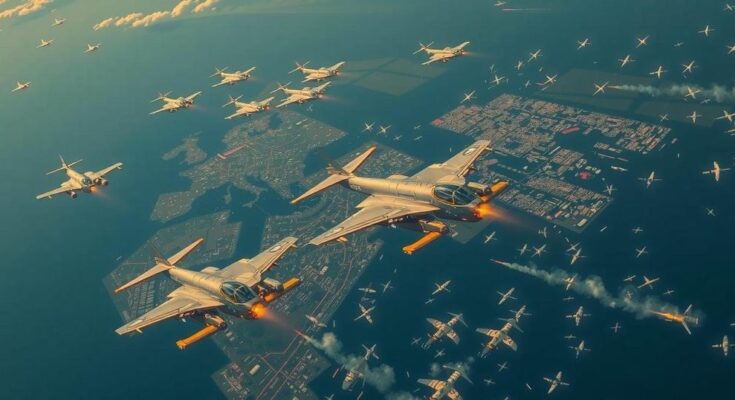Israel conducted airstrikes on Iranian military sites as retaliation for missile attacks against its territory. This escalation poses risks of further conflict between these adversaries amid increased violence in the region driven by Iranian-supported groups. The strikes had not seen prior identification of damage or casualties, with responses from both nations following the attack.
On Saturday, Israel executed a series of airstrikes against military targets in Iran, marking a significant military escalation between the two nations following a prior missile attack from Iran on Israel. Explosions were reported in Tehran, the Iranian capital, although precise information regarding damage or casualties has not yet emerged. This operation reflects Israel’s response to what it described as a relentless barrage of ballistic missiles fired by Iran into its territory, with military spokesperson Rear Admiral Daniel Hagari asserting that Israel, as a sovereign nation, has the obligation to defend itself against aggression. Israeli officials stated that the airstrikes were aimed at missile manufacturing facilities utilized for the production of the missiles that struck Israel earlier this month, as well as additional military capabilities and surface-to-air missile sites. This marked the first instance of Israel’s forces openly attacking Iranian military infrastructure. The situation is precarious, as both nations stand on the brink of potential war amid a broader context of escalating violence in the Middle East, propelled by proxy conflicts involving Iranian-supported groups such as Hamas and Hezbollah. Regional tensions have been exacerbated by Israel’s sustained military operations against Hezbollah in Lebanon and its ongoing offensive against Hamas in Gaza. Iran’s state media confirmed the explosions in Tehran but refrained from providing extensive details, possibly to mitigate public fear. The Iranian government has maintained air defense readiness in response to the strikes, and commercial flights were reported to have avoided Iranian airspace following the incident. Over recent months, Iran has launched retaliatory missiles towards Israel, citing defense of its interests amid rising hostilities following incidents where Iranian military leaders were targeted by alleged Israeli operations in Syria. Following the latest strikes, both Israel and the United States, which has substantial military presence in the region, are closely monitoring the implications for wider regional stability.
The escalating conflict between Israel and Iran stems from a complex web of historical grievances, military engagements, and geopolitical tensions. Following the 1979 Islamic Revolution, relations between Iran and Israel have deteriorated, with Iran’s leadership consistently calling for Israel’s destruction. Israel perceives Iran as its principal adversary, particularly due to its support for anti-Israel militant organizations such as Hezbollah and Hamas and its controversial nuclear advancements. This dynamic has given rise to a protracted ‘shadow war’ between the two nations, characterized by covert operations, military strikes, and proxy warfare across the region. Recent flare-ups of violence, particularly after the devastating attacks by Hamas on Israeli territory, have only added more fuel to the ongoing conflict, heightening the possibility of direct confrontations.
In conclusion, Israel’s recent airstrikes on Iran represent a notable escalation in military engagement, responding to previous missile attacks from Iran. This operation not only risks further destabilizing the already volatile region but could also potentially involve the United States due to its strategic alliances and interests in the Middle East. As the situation develops, the prospect of a broader regional conflict looms, amidst ongoing tensions with Iranian-backed militant groups.
Original Source: www.wral.com




